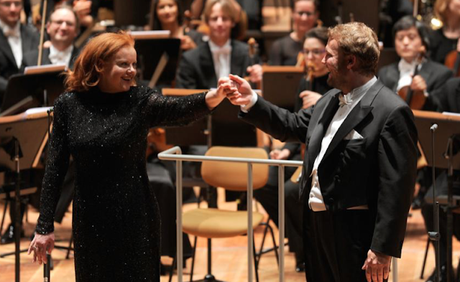by Paul J. Pelkonen

Fraternization: Melanie Diener and Robert Dean Smith in Die Walküre. Photo © PentaTone Recordings, courtesy Naxos Classics.
This Die Walküre was recorded in one day (November 24, 2012) at the Berlin Philharmonie. The second part of Marek Janowski's second complete Ring Cycle, it is a searing, exciting performance that has all the benefits of a live recording, within controlled conditions that are similar to the studio environment. The sound is sweeping and crystal clear, swooping through the stereo sound-picture like a host of warrior maidens on flying horseback.
Mr. Janowski and the Berlin Radio Symphony Orchestra are within sight of the finish line of their ten-opera Wagnerthon for PentaTone, and the excitement shows in every bar of the score. He opens the opera's first act with a furious storm scene and thrusts the listener into the drama of this burly warrior, a married woman and their discovery of each other and forbidden, incestuous love. Mr. Janowski molds the arc of this long act carefully, and achieves repeated, orgasmic payoffs as the act rockets to a close.
Robert Dean Smith is a sturdy Siegmund, with a bright, slightly "white" tenor voice that is a shade too noble for this seasoned warrior. He rises to the occasion in the great cries of "Wälse! Wälse!" but does not overdo the note values by holding them for an excessive amount of time. The voice opens and blooms in the big "Winterstürme" aria, sensitively accompanied by the rolling wave of the Berlin players. His greatest dramatic moment comes in the Act II confrontation with Brunnhilde, as he realizes that while he is invited to Valhalla, his beloved Sieglinde is not on the guest list. In that crucial moment when Siegmund threatens to kill his twin sister, Mr. Smith achieves something close to pathos.
His Sieglinde is soprano Melanie Diener, who captures the mystery and conflict of this woman, trapped in a marriage to the goonish Hunding. She sees her salvation and opportunity in this stranger, and convincingly falls in love with her brother in the course of the quick first act. Her spouse is played by Finnish bass Timo Riihonen. Singing with dark, full tone and resonant power to spear, Mr. Riihonen seems to enjoy the role of antagonist. He is also excellent in the second act, bellowing menacing lines over a pounding orchestra and making it sound easy. It isn't.
The breakout performance here is Tomasz Konieczny's carefully considered and fully mature Wotan. Anyone who (like this writer) was impressed by Mr. Konieczny's portrayal of Alberich (the villain of the Ring) at the Met earlier this season should hear this. He sings the score with attention to every detail in the music, capturing Wotan's bravado and the turmoil that follows in his long duet with his wife Fricka. (This is the veteran mezzo Iris Vermilion, who sounds merely as if she is finally out of patience with her philandering hubby. In the scene with Brunnhilde that follows, Mr. Konieczny unveils the scared little godling that lurks underneath all his bluster. With Mr. Janowski's quick-footed conducting, the long Act II monolog flies by, although none of the meaning is lost.
Less successful is Petra Lang, who falls into the category of Brunnhildes that are long on power and volume but shorter in beauty of voice. She pulls the famous "Hojotoho" cries hard and high, blazing fastballs past the listener. She does carry off the crucial "turn" in the character in the Annunciation of Death (where Brunnhilde learns compassion and decides to save Siegmund on the battlefield) but the overall effect of the performance is enigmatic. We never learn what makes this Valkyrie tick, and she is asleep at the end of the opera before we can learn more.
Thanks to Mr. Janowski's generally quick tempos, the first half of Act II, (two long scenes of dialog (between Wotan and Fricka and then Wotan and Brunnhilde) never flags. The second half, starting with the entry of Siegmund and Sieglinde on the run from Hunding is genuinely thrilling stuff, as the Valkyrie makes a series of fateful decisions in an effort to save the twins from Hunding's wrath. The best moment is when Wotan kills Hunding "with a glance", a moment that can seem comical in the theater but here becomes absolutely inhuman and chilling. The third act is one glorious arc, from the soaring and quick-footed Ride of the Valkyries to the last pages of the Magic Fire Music, the latter played with the dedication and focus that is usually reserved for chamber music.
Become a Patron!
Superconductor is free for everyone to read but it does cost money to produce. If you enjoyed this article, it's time to click over to Superconductor's Patreon page, and help support the cost of independent music journalism in New York City. Our Patreon program starts at the low cost of just $5 per month, less than a fancy cup of coffee in this town.

